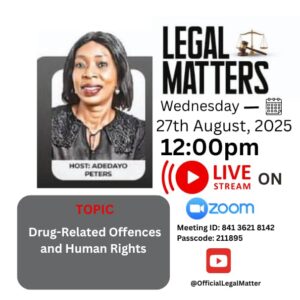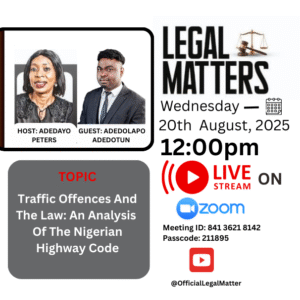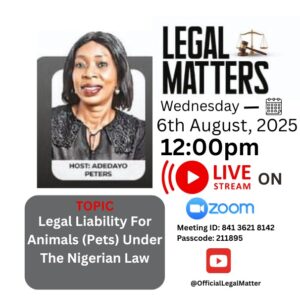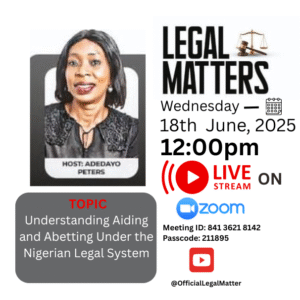-

Drug-Related Offences and Human Rights in Nigeria
August 27, 2025
Read moreNigerian drug laws (NDLEA Act, Criminal Code, Penal Code) impose strict penalties, but enforcement often triggers human rights concerns such as torture, prolonged detention, and lack of access to fair trial.
International treaties and Nigerian case law emphasize the need to balance drug control with fundamental rights like dignity, privacy, and health.
A rights-based approach calls for rehabilitation, legal reforms, and accountability rather than over-criminalisation.
-

Traffic Offences and the Law: An Analysis of the Nigerian Highway Code
August 20, 2025
Read moreThe Nigerian Highway Code (NHC), FRSC Act 2007, and National Road Traffic Regulations form the backbone of traffic law enforcement in Nigeria.
Common offences include speeding, drunk driving, seatbelt violations, phone use while driving, reckless overtaking, and driving without valid documents.
Weak enforcement, corruption, poor road infrastructure, and low public awareness are the major challenges limiting effectiveness.
-

Protecting Patients Rights In Nigeria
August 13, 2025
Read morePatients in Nigeria have rights guaranteed under the Constitution, National Health Act 2014, and other statutes, including the right to emergency care, dignity, confidentiality, and non-discrimination.
Breaches include denial of emergency treatment, failure to obtain informed consent, and breaches of privacy — all of which have legal consequences.
Patients can seek redress through civil suits, regulatory complaints, and consumer protection bodies.
-

Legal Liability for Animals (Pets) Under the Nigerian Law
August 6, 2025
Read moreThe Nigerian law distinguishes between wild animals (ferae naturae), where owners face strict liability, and domesticated animals (mansuetae naturae), where liability usually depends on negligence.
Owners can face civil liability (trespass, negligence, nuisance) and criminal sanctions (e.g., under the Criminal Code or Police Act) when their pets cause harm.
Defences include provocation, trespass by the victim, or unforeseeable events, but pet owners are still expected to act responsibly.
-

Accessory After the Fact and the Nigerian Legal System
June 25, 2025
Read moreAn accessory after the fact is someone who helps a criminal avoid justice after the offence has been committed.
Nigerian law (Criminal and Penal Codes) criminalizes such assistance, with penalties ranging from 2 to 7 years imprisonment.
Proving knowledge and intent is key, and cultural/family loyalty often makes prosecution difficult.
-

Understanding Aiding and Abetting Under the Nigerian Legal System
June 18, 2025
Read moreAiding and abetting means providing support, encouragement, or assistance to someone committing a crime.
Nigerian law treats aiders and abettors as equally guilty as the main offender.
Punishment depends on the seriousness of the underlying offence.